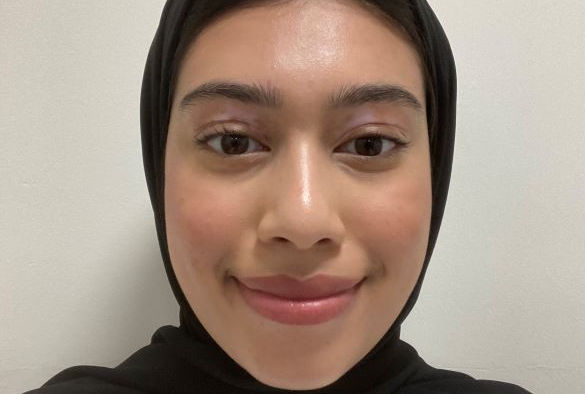Summer internship: Exploring attitudes towards pregnancy and childbirth among childless women

This summer Zahra Musa, a second year BSc Psychology student, has spent time on a research internship under the supervision of Dr Leanne Jackson, a lecturer in the Department of Psychology.
Zahra is currently working on a research project exploring attitudes towards pregnancy and childbirth among childless women.
Here, Zahra and Dr Jackson discuss the summer internship, conducting the research project at the Department of Psychology and the benefits of taking part in the internship.
How did you become involved with the summer internship programme?
Zahra: It was just before Christmas. We got an email saying that applications would be opening very soon. I knew about the summer internships from my Academic Advisor – she's called Katie [Clarke]. She mentioned that she completed an internship and she said to look out for those, as it’s a good opportunity for work experience.
What are your day to day tasks?
Zahra: Each day is different, in the sense that I can choose what I want to do on each day. Since I’ve started, I’ve mostly been transcribing. In the background I have been doing recruitment for one of Leanne’s other projects. That has mostly been on Facebook, posting the study advertisements.
Recently, I started doing the reading and research for my research project. We’re just waiting for the ethics to come through on that. I’ve been doing research to begin writing up the introduction and the methods.
What has it been like working with one another?
Zahra: Leanne has been great – very supportive. She really supported me with the ethics application. I found that [the ethics application] quite difficult because it was quite new, quite lengthy, but Leanne has been great at guiding me across the entire project.
Dr Jackson: Likewise, I’ve really enjoyed working with Zahra. She is a diligent student, and it has been a pleasure to work with her. She came to me after the lecture and was very self-motivated, which is always a good sign when a student already has ideas in mind that they want to work on. It is lovely to have the opportunity to nurture that.
I did my Undergrad at the University of Liverpool, and I did the internship over the summer too, so it feels very nice to be full circle and be involved in building those research interests. I’ve been very mindful to give Zahra a lot of opportunities to do different things – the transcriptions, secondary data analysis. They’re the sort of skills that you otherwise don’t really develop properly until the Masters, when you do a lot more independent research. I’ve been trying to steer towards independent research, and it’s been lovely to do that with such a self-motivated student.

Dr Leanne Jackson is supervising Zahra Musa during the summer internship.
What are the benefits of taking part in a summer internship for your studies and future employability?
Zahra: What I really noticed especially in second year, is that we don’t really get an opportunity to work with qualitative research. We have one module that used it as an assessment and we had a couple of lectures on it, but the main thing is quantitative research. I felt that I didn’t know much about it.
With the interviews and things, it’s a skill that I would really like to have, given that eventually I want to go into a career where I’d be talking to people. Qualitative research was the main thing that I was interested in. The work experience is priceless – just to have some first-hand experience in that.
Dr Jackson: In terms of skills development, like Zahra says, if you’re interested in a career in research then it is invaluable to get that experience. Otherwise, unless you’re doing a qualitative research project for your third-year project, you don’t have much exposure to qual.
Similarly in research, things take a lot longer than you think. Ethics can take a few more months that you expect and there’s usually a few snags with recruitment.
Again, if you’ve not had much research experience before, once you get to your Masters or PhD, it can be a bit of a shock and a steep learning curve. The internship schemes are a really nice stepping stone to get you used to being resilient and needing to change the research, which is often required of academics. It prepares you quite well for a career in academia.
Why should a student study a summer internship at the University of Liverpool and Department of Psychology?
Zahra: Psychology is so broad. You have the opportunity to contact any lecturers and they will take your email. Maybe they’ll say no, but you can contact anybody and say, ‘are you willing to take an intern?’ I remember mentioning to Leanne that I didn’t know her area of research was something that came under Psychology until her lecture.
I think having that broadness in terms of the research areas that are available in the department is just so interesting. You really can do anything. Even if eventually that’s not something you end up researching or the area you go into, at least you have some background knowledge in something else. I thought it would be a good experience.
What advice would you give to students who want to take part in a summer internship?
Zahra: Don’t ignore the emails. Even if you don’t want to do the BPS [British Psychological Society] internship, you can just do a department one. Just reach out to a lecturer and ask if they are willing to support you on a research project.
Get in early, because by the time I started reaching out to people, I know some other lecturers already had interns. Get in early, do some background reading and firm up your application.